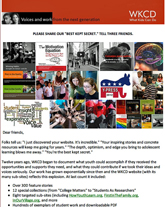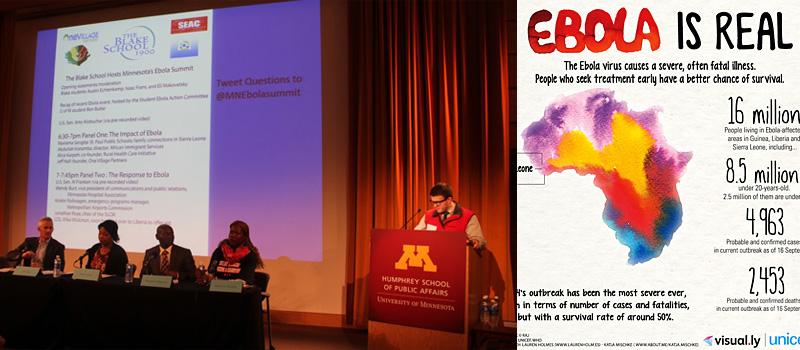 There's a radical - and wonderful - new idea here . . . that all children could and should be inventors of their own theories, critics of other people's ideas, analyzers of evidence, and makers of their own personal marks on the world." - Deborah Meier, Educator There's a radical - and wonderful - new idea here . . . that all children could and should be inventors of their own theories, critics of other people's ideas, analyzers of evidence, and makers of their own personal marks on the world." - Deborah Meier, Educator

SUBSCRIBE TO OUR NEWS BLAST
OTHER WKCD WEBSITES
First In The Family
Fires In The Mind
How Youth Learn
Social-Emotional Learning
Next Generation Press
Center for Youth Voice
In Our Village
Life in New China
SPECIAL COLLECTIONS
Advice for Parents
Student/Youth Voice
College Matters
Global Youth Voices
Just Listen!
Mentors That Matter
Service Learning
Students as Allies in School
Reform
Student Research for Action
Voices from the Middle Grades
Youth in Policy: Civics2
Youth on the Trail 2012
POPULAR WKCD PUBLICATIONS (PDFS]
A Guide to Creating Teen-
Adult Public Forums
Cultural Conversations through Creative Writing
Documenting Immigration Stories
First Ask, Then Listen: How Your Students Can Help You Teach Them Better
Making Writing Essential to
Teen Lives
Profiles of Politically Active Youth
Queer Youth Advice for Educators
SAT Bronx
The Schools We Need: Creating Small High Schools That Work for Us
|
Minnesota Students Take Aim at Ebola
by WKCD|February 12, 2015

MINNEAPOLIS, MN—Senior Isaac Frans was looking forward to joining his school's service trip to Sierra Leone last summer when the Ebola outbreak dashed all plans.
“We were going to see what grassroots charity is all about,” Frans told a reporter from the local newspaper, the Star-Tribune. “We wrote letters, learned about this community and this country.”
It was hard, he said, “to watch a small outbreak turn into this huge outbreak.” It was harder, still, “to realize that I lived in a place that cared, but people only cared when they thought it would come here.”
Recognizing the gravity of the situation, Frans set about organizing a summit to raise awareness about Ebola’s impact and the local response to it. The effort was part of a new course at the Blake School, a 115 year-old private school in Minneapolis with a long tradition of educating students to be global citizens. The course, "Global Theories, Local Realties," designed by Dion Crushson, director of international programs at Blake, had no curriculum. Instead, Crushon charged Frans and his classmates with developing action plans to confront global problems.
For Frans and project partners Austin Echtenkamp and Eli Makovetsky, few global issues seemed as urgent as the Ebola epidemic, even if optimistic projections that it would subside—in the short run—proved true.
 One of the main things that I’ve learned in this class is that you can actually make change when you put your mind to it. After going through the whole Ebola Summit, I really gained a new respect for everyone involved, that we were able to come together to produce something as big as we did. We talked early in the semester about being “effective change agents” and I think that is something that we really lived up to. - Charles Austin, senior One of the main things that I’ve learned in this class is that you can actually make change when you put your mind to it. After going through the whole Ebola Summit, I really gained a new respect for everyone involved, that we were able to come together to produce something as big as we did. We talked early in the semester about being “effective change agents” and I think that is something that we really lived up to. - Charles Austin, senior
|
In November 2014, the students invited politicians, health care experts, and African community members to take part in a panel discussion. With the help of fellow classmates, the pair hosted the public event at the University of Minnesota, welcoming a number of prominent panelists including representatives from African Immigrant Services, the Minnesota Hospital Association, the Metropolitan Airports Commission, and the nonproft OneVillage Partners which works on economic development in West Africa. U.S. Sens. Amy Klobuchar and Al Franken ‘66 and U.S. Rep. Keith Ellison sent in pre-recorded videos.
For senior Eli Makovetsky, building empathy, at the conference and person-to-person, was crucial. “Ebola is not here and, because the United States is a First World country, it’s not going to spread here," he told the Star-Tribue. "But what can we do to help West Africa?
We [need] to decrease the idea of separation and apathy.”
On February 5, 2015, an article in The New York Times reported the first weekly rise in new Ebola cases this year, countering the downward trend in the disease that has ravaged three West African nations. The 124 new cases—39 in Guinea, five in Liberia and 80 in Sierra Leone for the week ended Feb. 1—amounted to a relatively small increase from the 99 new cases the week before, and paled in comparison with the hundreds of new cases per week that traumatized those countries and alarmed the world in the later months of 2014. Still, it alarmed the experts. A representative from the World Health Organization told the Times,"The virus has told us this week, loud and clear, ‘I am not going away the way you’re expecting me to.'"
Isaac Frans and his project partners know their work sustaining local awareness is not done.
BLAKE STUDENT REFLECTIONS ON THE EBOLA SUMMIT
Isaac Frans: I mean seriously who would’ve thought that a group of random high schoolers would be able to get 100 people to show up to anything let alone a summit about Ebola. But it really was the summit that changed my view on me. I feel like we were very vulnerable because we ran the risk of no one showing up on the night of the environment. This would’ve meant that we wasted the time of panelists, wasted a lot of Blake’s money, and wasted quite a bit of our one time and hard work. But we pulled it off somehow.Cha
Austin Echtenkamp: As cheesy as it sounds I think this class has actually made me a better person. I have learned to fully understand other’s issues and develop a genuine care for them. It is sometimes difficult for a high school student to truly develop genuine sympathy for an issue that might not be personally connected to them, but having carried out this Ebola project, we were asked to take into consideration other people’s backgrounds, sensitivities, motives, and ultimately determine the message that we were trying to send and I think that these experiences changed me as a person/global citizen….
Ultimately what we have done in this class has brought not only us, but also people around to want to act more. Something that I touched on in class was the fact that in the aftermath of the Ebola Summit I had loads of people coming up to me asking “What can we do now?” or “I am going to do this now.” It was very cool to see that our actions almost had a pass-it-on effect of sorts. I was able to see so much joy and appreciation from the people who attended the Ebola Summit or even from those who could not make it and it was those people who helped me realize how cool what we were doing was. It is this feeling that pushes me to want to act more. I finally felt like something I was doing was truly helping or having an impact on another human and now I feel like “What can’t I do to make a change?” The Ebola Summit was a pretty large feat to carry out.
Eli Makovetsky: With the Ebola Summit, after seeing how much impact the panel had on the audience, I realized first hand the scale at which empathy can affect people. The reaction showed me that the key way to solving an issue, whether there are conflicting ideas or not, is to link people emotionally to that issue.
Robyn Lipschultz: I also changed a lot through planning the Ebola Summit. This event forced me to step out of my comfort zone, particularly by making phone calls. Having to talk to a variety of people on the phone and over email really showed me a taste of the real world. Having to book an auditorium space involved reading contracts, bills, and making sure everything was set up how we wanted it. These tasks really helped me mature and gave me a taste of the real adult world. Even though these skills may not have been the purpose of this class I still feel this is how I changed. |
What Kids Can Do, Inc. | info@whatkidscando.org | www.whatkidscando.org
Copyright © 2015 What Kids Can Do, Inc.
|



